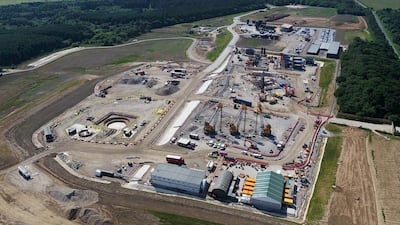More than 1,500 metres beneath the rolling beauty of the North Yorkshire moors, a rich seam of mineral wealth that stretches across hundreds of square kilometres could bring billions to the regional and national economies.
It’s not oil or gas that lurks there but a naturally occurring mineral called polyhalite, a substance formed more than 250 million years ago, which contains sulphur, calcium, potassium and magnesium, four of the six elements essential for plant growth.
It has the potential to revolutionise the world of agriculture. It’s an organic fertiliser whose extraction and refining creates practically no waste product. If things go to plan, it could be taken out of the ground and sent to market within the space of a day by 2021.
_______________
Read more:
Robot farmers use precision attacks in war on weeds
_______________
The mineral will be mined, taken over tens of kilometres on a subterranean conveyor belt, then ground down and processed at a site next to a deepwater port. From there it will be shipped across the globe to confirmed customers in Asia, the Americas and beyond.
With the world's population set to hit nine billion by 2050, the 21st century is going to be defined by the struggle to feed more and more people from shrinking agricultural land resources. Advancements in fertiliser technology are going to be at the forefront of that fight.
Sirius Minerals, a mining company formed in 2003, believes that with polyhalite – to be marketed as POLY4 – it has found a product that will potentially bring in more than £2.5bn of exports a year when the project is running at full capacity by the late 2020s and create thousands of jobs.
However, before Sirius can even take a single tonne from the ground, they will have had to embark on one of the most extraordinary extraction operations seen in the industry, one that will see the deepest mine in Europe sank and the longest tunnel in the UK built.
Three kilometres inland from the picturesque seaside town of Whitby, the main site of the project is at Woodsmith mine, below the North York Moors National Park, a protected expanse of more than 1,430 square kilometres of heather moors, pasture and woods.
The mine will consist of two shafts sunk to 1,520m, the level of the 70m layer of polyhalite. Remotely operated machines will excavate the mineral, and it will then be taken up to a depth of 360m, where the 37km conveyor belt will take it to the handling facility at Teeside harbour.
Whereas the mining of most ores creates more waste than finished product, the purity of the seam at Woodsmith means all that will happen to the mined mineral is that it will be ground down and turned into POLY4 granules, before being loaded on to ships.
To assuage local fears that the project would compromise the landscape, Sirius has committed to industrial standards which will see more records claimed in this, the first new mine to be sunk in the country for 40 years.
The headframes – structures which contain the winching equipment that operates the lifts in the shafts – will be entirely underground, a unique feat. Construction of the shafts will be a novelty, too: the initial 120m will be bored down, rather than blasted with explosives, a British first. And the machine drilling down to 1,500m has only been used twice before around the world.
The entire footprint of the mine when the site is fully operational will consist of a scattering of agricultural-style buildings – the entire site will also be covered by 7,000 hectares of woodland, allowing for the carbon emissions of the construction period to be offset.
As Maurice Rankin, general manager of corporate communications for Sirius, says: “Sustainability [has been] at the core of everything we do – sustainable mine design, with as low an environmental impact as possible and stringent mitigation measures where necessary.
“This has resulted in unique innovations such as the sunken headframes and the underground transportation system, which had never been done before anywhere else in the world, to create an essentially invisible mine that will disappear into the landscape, at the same time as providing economic opportunity for generations to come.”
The company is currently in the middle of a second round of financing. The initial stage raised $1.2bn (Dh4.4bn) in 2016, which has funded the advanced state that both the Woodsmith and Teeside sites are in.
By the end of Q1 in 2019, Sirius aims to have secured an additional $3.4-3.6bn – $1.5bn in commercial loans matched by the same figure in a loan guaranteed by the British government, with the excess likely to come strategic partner financing, alternative sources of structured capital including subordinated debt and leasing providers, as well as accessing the capital markets through convertible notes or new equity.

